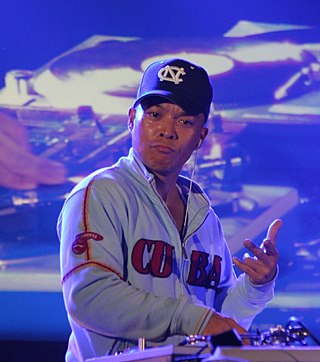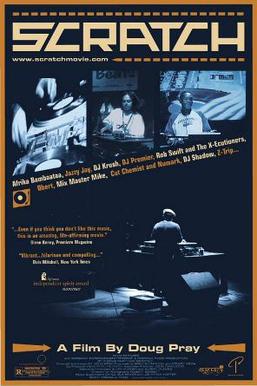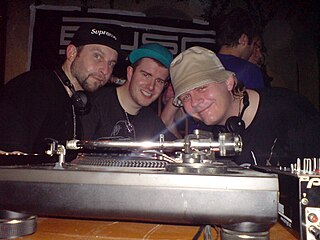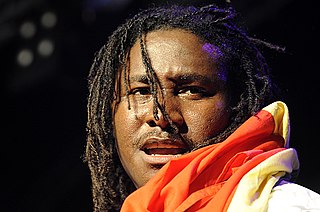
Scratching, sometimes referred to as scrubbing, is a DJ and turntablist technique of moving a vinyl record back and forth on a turntable to produce percussive or rhythmic sounds. A crossfader on a DJ mixer may be used to fade between two records simultaneously.

Turntablism is the art of manipulating sounds and creating new music, sound effects, mixes and other creative sounds and beats, typically by using two or more turntables and a cross fader-equipped DJ mixer. The mixer is plugged into a PA system and/or broadcasting equipment so that a wider audience can hear the turntablist's music. Turntablists typically manipulate records on a turntable by moving the record with their hand to cue the stylus to exact points on a record, and by touching or moving the platter or record to stop, slow down, speed up or, spin the record backwards, or moving the turntable platter back and forth, all while using a DJ mixer's crossfader control and the mixer's gain and equalization controls to adjust the sound and level of each turntable. Turntablists typically use two or more turntables and headphones to cue up desired start points on different records.
Beat juggling is a deejaying and turntablism technique in which two records are used to prolong an existing beat, or to create a new one. It is associated with the context of hip hop, but not necessarily limited to this genre.
Killa Kela is a British beatboxer and rapper from West Sussex.

Scratch is a 2001 documentary film, directed and edited by Doug Pray. The film explores the world of the hip-hop DJ from the birth of hip-hop when pioneering DJs began extending breaks on records, to the invention of scratching and beat juggling, to the more recent explosion of turntablism. Throughout the documentary, many artists explain how they were introduced to hip-hop while providing stories of their personal experiences.
The Invisibl Skratch Piklz are an American group of turntablists.

The Scratch Perverts are a collective of turntablist DJs from London, formed in 1996 by Tony Vegas, Prime Cuts and DJ Renegade.

DJ Craze is a Nicaraguan American DJ and record producer who plays hip hop, Miami bass, trap, breaks, dubstep, drum and bass, and practices turntablism. He was, until 2020, the only solo DJ in history to win the DMC World DJ Championships trophy three times consecutively (1998–2000).

Positive Black Soul is a hip hop group based in Dakar, Senegal, one of the first such collectives in the country. Founded in 1989, the group is composed of Didier Sourou Awadi and Amadou Barry, both of whom had previously been in other hip hop groups. They perform in the English, French, and Wolof languages and use traditional Senegalese instruments as part of their songs. Political and social activism have played important roles in the group since it was founded.

Wax Murdaraz are a group of hip-hop musicians specialising in vinyl deejaying and music production. The group operates Wax Murdaraz Professional DJ Skool in St. Louis, Missouri, training people in hip-hop deejaying.

Frederick Crute, known professionally as Kool DJ Red Alert, is an Antiguan-American disc jockey who rose to fame on WRKS 98.7 Kiss FM in New York City and is recognized as one of the founding fathers of hip hop music and culture. His weekly radio show airs on WBLS 107.5 FM from Monday to Saturday at 6pm EST.

Didier Awadi is a Senegalese rapper and a significant figure in Francophone West African hip hop. As a founding member of Positive Black Soul (PBS) with Duggy Tee, Awadi toured around the world contributing to the international popularity of Hip Hop Galsen. Awadi works as a solo artist, accompanied by his crew PBS Radikal. He participates in the Senegalese music industry through his label, recording studio, and rehearsal space, Studio Sankara. Awadi offers a conscious and revolutionary style of music strengthened by articulated and rooted messages. His motivation and inspiration is grounded in the Burkinabé revolutionary Thomas Sankara's phrase: "Let's dare to invent our future!"

Negrissim' is a hip hop crew from Cameroon formerly based in Dakar, Senegal, despite their members travelling regularly between Europe and Africa.

Pee Froiss is a hip hop group formed in Dakar, Senegal in 1993. It was originally a dance group which refocused on rap. Early on, Pee Froiss received mentorship from the Senegalese rap luminaries Positive Black Soul, which produced their first album Wala Wala Bok? in 1996. The band's music is rapped in Wolof, French, and English and features traditional Senegalese instruments such as the kora as part of its instrumentation. Pee Froiss was one of the first rap groups to include a female performer in their lineup, Sistah Joyce. The group created all of their own music videos with very sparse resources, the first of which was released with their first album. Wala Wala Bok? is considered a classic of Senegalese hip hop. Alongside, Positive Black Soul and Daara J, Pee Froiss emerged as trailblazers in Senegalese hip hop, galvanizing a generation by intertwining the genre with themes of political resistance and social activism.
ALIF is the pioneer female hip hop trio of Hip Hop Galsen. Emerging in the late mid-1990s, ALIF offered a feminine and feminist flavour to Hip Hop Galsen encouraging women to play their part in the movement. The group split beginning of 2010 after thirteen years.
Keyti is one of the first and most prominent hardcore hip hop artists in Senegal. With his group Rap’Adio, he offered a radical approach to Hip Hop Galsen violently recalling the initial purpose of hip hop as a means to denounce society’s flaws. Still radically critical, though less hardcore, Keyti now evolves in solo. He is part of the West African hip hop collective AURA and performs in its well-known musical comedy The Extraordinary Stories of Poto-Poto Children.
Matador is one of the most prominent figures of underground Hip Hop in Senegal. Founding member of the Thiaroye’s group, WA BMG 44, Matador has toured throughout the world gaining an international recognition from the underground hip hop scenes abroad. Since 2006, his struggle to represent the voiceless youth of his home country has taken a renewed turn with the creation of his structure, Africulturban in Pikine. Through this space dedicated to the youth, Matador reiterates his social and political engagement while pursuing his role of “Number One System Enemy” and “General Major Chief of the Dying People Army”.
Simon Bisbi Clan is one of the most visible hip hop artists on the contemporary scene of Hip Hop Galsen. After his beginnings in Dakar, Simon grows from his diverse experiences on other hip hop scenes abroad during five years before coming back to his hometown. Since his return, he has been intensively contributing to the development of the musical sector in Dakar with the creation of his LLC, 99 Records, a structure dedicated to the promotion of Senegalese urban music and centred on the label “Djolof 4 Life Entertainment”.

Following an historical process of appropriation of American popular music by Senegal, hip hop emerged in the Senegalese capital city in the early mid- 1980s. Although hip hop galsen is now famous for its diverse musical productions, the movement there spread out from its dancing appeal rather than from its musical one. Indeed, Senegalese hip hop artists initially participated in this movement as smurfer, breakdancer, B-boy in general performing during organised podiums. Schools, nightclubs and other temporary public stages thus played an essential role in amplifying this movement in Dakar. Besides, and in contrast to American hip hop, which grew from the youth in the inner city ghettos, hip hop in Dakar began among a somehow middle-class youth who was able to access and/or introduce in their home place new ideas and new cultural expressions coming from abroad. Indeed, hip hop became popular in the capital city through the intensive through informal circulation of VH7 cassettes and recorded videos, which were imported from USA or France by diaspora people.
Waga Hip Hop is one of the major international hip hop festivals taking place in West Africa. Each year, around early and mid-October, Ouagadougou thus welcomes international artists and media to attend this festival of urban cultures.












